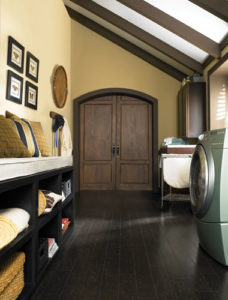One of the major trends in flooring in recent years has been moving the outside indoors. Whether it’s celebrating the rustic characteristics of hardwood or the slate and travertine textures offered in the ceramic category, consumers want something real and natural underfoot. Cork is one product that fits the bill.
There is probably no better example of something more natural and more eco-friendly than cork flooring. So what are some aspects that make cork such a gift of nature?
According to Gary Keeble, marketing manager for USFloors, the story, or gift, comes from Portugal. “It begins in the Montado (the Portuguese cork oak forest), where the time-honored tradition of the cork oak harvest takes place. For nine years, these cork oak trees carefully transform their outer shell into dense, resilient cork bark. This natural process gives way to cork flooring.
“The tree is never harmed, and the quality of cork actually improves with every harvest. The fact is that the cork oak forest has been developed and maintained to sustain a triple bottom line industry—one that is good for the people, for the planet and for the economy. Portuguese cork makes for authentic, high quality and eco-efficient flooring that is created with true craftsmanship and care.”
Paulo Nogueira, managing director of Amorim Flooring, agreed, adding that cork is a natural renewable product. “The cork industry doesn’t damage or harm the environment where the raw material is obtained. Cork itself has a number of properties that translate into features and benefits of cork products. It’s hypoallergenic, resilient, comfortable, warm, durable and a sound insulator. When consumers buy cork products they enjoy these benefits; that’s the gift from nature.”
Ann Wicander, president of WE Cork, believes cork’s air cells give it the attributes that have been appreciated for over 100 years. “The air cells offer a sound dampening effect that make it an ideal choice for libraries, churches, museums and, of course, any room in the house. They also offer thermal insulation, which make the floor warmer in the winter and cooler in the summer and makes the home or building more energy efficient. The air cells also absorb impact and are appreciated by those of us who have arthritis and prefer a forgiving floor, as well as those who have kids.”
Randy Gillespie, vice president of sales and marketing for Expanko, echoed Wicander’s point on softness underfoot. “Cork used in a job application provides  patterns and designs only found in cork. Additional benefits of the reduction of impact sound and sound transfer are exceptionally high. The comfort or perceived softness underfoot is easier on the human body, reducing stress on the occupant.
patterns and designs only found in cork. Additional benefits of the reduction of impact sound and sound transfer are exceptionally high. The comfort or perceived softness underfoot is easier on the human body, reducing stress on the occupant.
“Cultures have been built around the harvesting of the cork bark and the many animals and plants that occupy the cork forests,” he explained. “The many benefits of the cork bark make it one of the most useful materials that does not require the death of the source in harvest.”
The perfect floor
As Keeble noted, it is what cork has that other flooring does not that makes it so special. “The natural properties of cork provide a unique combination of warmth, resilience and comfort underfoot not found in other flooring types. Other floors may possess some of these properties, but none provide all of them and are sustainable. In addition, the cork oak produces a substance called suberin, which protects the tree from mold, mildew, pests and provides resistance to fire.”
When it comes to selling cork, he believes product knowledge plus confidence equal profits. Flooring retailers must have a comfort level with cork in order to sell it effectively. “Most importantly, knowing it is harvested from the bark of the cork oak tree every nine years and the tree is never cut down in order to harvest the material for the floor.”
He also noted it is critical the retailer stress cork’s style story, including the patterns, textures, colors and formats available, as well as its sustainability story to the end user. Also, the consumer needs to recognize the myriad of benefits that support the product and add substantial value to the purchase. “Cork is the only flooring that mixes the best of soft surface and the best of hard with its inherent benefits to create what could quite possibly be the perfect floor.”
As Wicander concluded, the end user needs to know that cork is a resilient, renewable, wood floor. “It is not fragile but very durable. The floating floors can be used below grade and are ideal for basements.”
-Louis Iannaco
